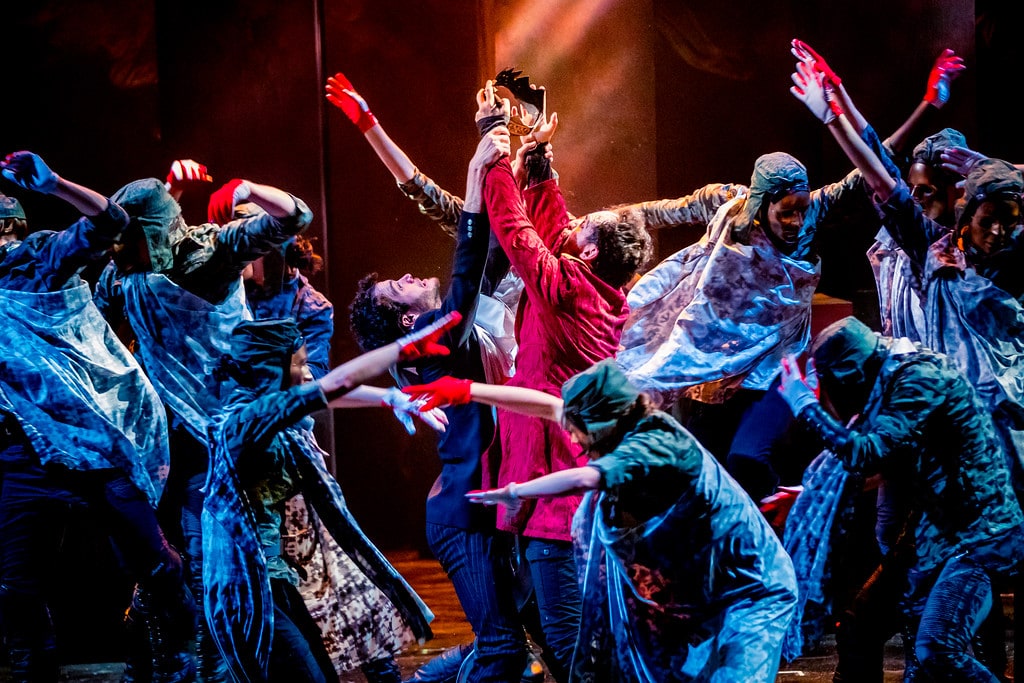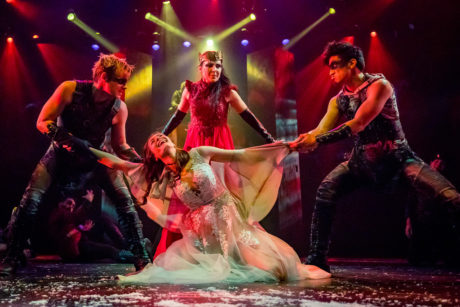“A work of art has value only if tremors of the future run through it…”
— André Breton (1896–1966) French writer, poet, and founder of Surrealism.
Artistic Director Paata Tsikurishvili likened Synetic’s Titus Andronicus to a “Roman Game of Thrones.” It is like Game of Thrones in a way – it is full of reverses of fortune, flamboyant images, and visual and aural excitement. It is further proof that Synetic’s novel form of physical theater is vital and revolutionary.

A classic revenge tragedy, Titus is focused on themes of family and betrayal. It was very popular in its day, then fell out of favor for a long time. The extreme violence of the action was simply too much for some audiences. However, Peter Brook’s successful production in the 1950’s and Julie Taymor’s acclaimed film adaptation (1999) brought it back into the repertory.
When Synetic co-founders, husband and wife Paata and Irina Tsikurishvili, moved to the United States from the Republic of Georgia, they brought a broad range of dance, theater, and film training. Their “Wordless Shakespeare” combines the traditions of their native country with American style, resulting in an innovative kind of visual storytelling. Synetic’s aesthetic includes elements of modernism, expressionism, abstract painting, photorealism, as well as surrealism.
The entire performance passes quickly, like a dream. It is as if after going to a traditional production of Titus, we went to sleep and had a dream which revealed to us all the secrets of the play. The fusion of dance, music, lighting, and sound draws us into a richly imaginative world. Titus is famous for scenes of mutilation, murder, and assault, among other things, but the violence has the texture of a dream, and the dream-like aspects distance us emotionally from the dreadful events taking place onstage. There is no stage blood. The multiplicity and intensity of the incidents lend themselves perfectly to the Synetic approach.
Initially, we see a series of platforms, with a gray backdrop. Soldiers tramp onstage. They march and move in flawless formation. We see Titus (Philip Fletcher), the victorious general returning to Rome from war with the Goths. He has prisoners, among them Tamora the Queen of the Goths (Irina Tsikurishvili). She wears a fairy-tale crown, a black costume, and a flowing red skirt. Black, red, and gray are the signature colors of the production. The image of Tamora, a powerful, sensual woman, is one of the most memorable of the evening.

Titus sacrifices one of Tamora’s sons, Alarbus (Scott Turner) as part of the burial ritual which he performs when returning from battle. Tamora has two remaining sons, Chiron (Alex Mills) and Demetrius (Dallas Tolentino). They attack when necessary with snake-like precision, and they are burning with energy and vitriol.
Brothers Saturninus (Dan Istrate) and Bassanius (Scott Whalen) are the sons of the late Emperor. At first, they display a fierce rivalry for the crown. Later, when the elder of the two, Saturninus, becomes Emperor, he makes the captive Tamora his queen. Bassanius marries Lavinia, Titus’s daughter, with tragic consequences. Irina Kavsadze as Lavinia is wonderfully sympathetic and sensitive. She suffers the most, enduring sexual attack, amputation of her arms, and worse.
Philip Fletcher is a fine Titus and is especially effective in the mad scenes. His brother, Marcus, becomes a sister, Marcia, and is performed with energy and passion by Tori Bertocci. Chris Galindo is an able Lucius; his fate, as Titus’ only son to survive, will be crucial to the fortunes of his family. Audrey Tchoukoua as Aaron has magnificently passionate scenes with Irina Tsikurishvili’s Tamora, and his desperate effort to save his child wins our compassion despite his many previous misdeeds.
Director Paata Tsikurishvili and Choreographer Irina Tsikurishvili, who also plays Tamora, have created an important work of art. The adaptation, by Emily Whitworth, suits their purposes beautifully. Costume Designer Erik Teague, Lighting Designer Brian S. Allard, and Scenic Designer & Technical Director Phil Charlwood bring a sophistication and level of detail to their work which makes the performance an outstanding one. The music (Composer Konstantine Lortkipanidze) and sound (Sound Designer & Audio Engineer Thomas Sowers) are hauntingly evocative.
Every performer succeeds and deserves our attention. Other cast members are: Alarbus/Ensemble: Scott Turner; Quintus/Ensemble: Matt Stover; Ensemble: Suzy Alden, Megan Khaziran, and Nutsa Tediashvili.
Don’t miss this astonishing Titus Andronicus. It is one of Synetic’s finest achievements.
Running Time: 95 minutes, with no intermission.
Titus Andronicus plays through May 27 2018, at Synetic Theater – 1800 South Bell Street, in Arlington, VA. For tickets, call the box office at (866) 811-4111, or purchase them online.





When I first observed the artistic work of Gabino Amaya Cacho I thought they were valuable figurative paintings. Now he paints something new and original, abstract pointillism, leaving the figurative for the moment. These paintings have a high level of abstraction, almost hypnotic and sets the imagination to flight, each point seems to have a different meaning, which each mind of each viewer grants it. I love his painting. What do you think?